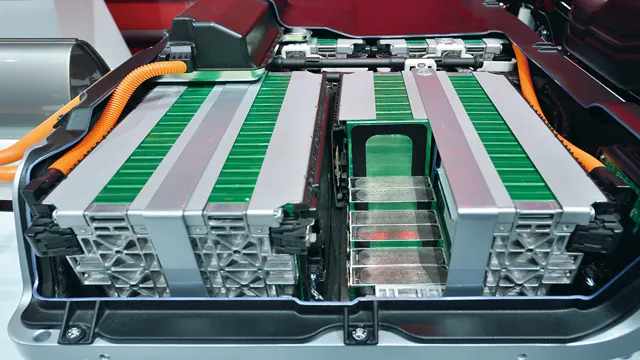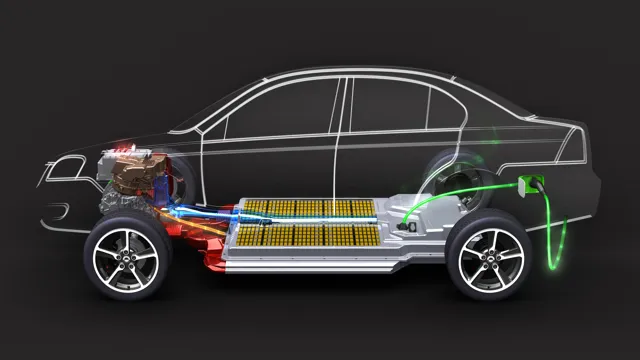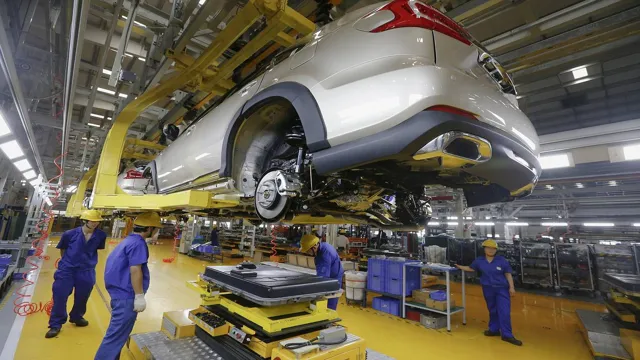Revolutionizing the Future: The Buzz on All Electric Car Batteries
Electric cars have been around for decades, but they’re only now gaining significant traction in the auto industry thanks to advances in battery technology. Today, the market for electric vehicles is booming thanks to the many benefits they offer such as reduced emissions, lower fuel costs and quiet, smooth operation. However, when it comes to selecting an electric vehicle, one of the key considerations is the battery that powers the car.
As such, this blog post dives into “All About Electric Car Batteries,” including how they work, their types, components, charging and the future of electric car batteries. So whether you’re already an EV owner or considering purchasing one, keep reading to learn all about what makes electric car batteries so important.
How Do Electric Car Batteries Work?
Electric car batteries are the powerhouse of these vehicles. Their main function is to provide the energy required to run the electric motor, which, in turn, propels the car forward. All electric car batteries are made up of several cells, each containing two electrodes – a cathode and an anode.
The cathode is the positive electrode, while the anode is the negative electrode. These two electrodes are separated by a thin sheet of material called the separator, and they are immersed in an electrolyte solution. When the battery is charged, the cathode and anode become positively charged and negatively charged, respectively.
During discharge, the movement of electrons from the anode to the cathode generates electricity, which is used to power the electric motor. In order to improve performance and increase range, modern electric car batteries use a variety of materials, including lithium-ion, nickel-cadmium, and nickel-metal hydride. These technologies are continuously evolving, and we can expect even more advanced batteries in the future.
An Overview of Lithium-Ion Batteries
Electric car batteries are typically lithium-ion batteries. These batteries use chemical reactions to store and release energy. When the battery is charged, positively charged lithium ions move from the cathode to the anode.
During discharge, these ions move back across the electrolyte to the cathode, releasing their energy along the way. The battery uses a variety of materials to facilitate this process, including lithium cobalt oxide and graphite. Advanced batteries may also use materials like lithium iron phosphate or lithium manganese oxide.
These advanced materials can improve the performance and longevity of the battery, making it ideal for use in electric cars. Overall, electric car batteries are a crucial part of the shift towards more sustainable transportation options.

What Makes Electric Car Batteries Different?
Electric car batteries are different from conventional car batteries in a number of ways. While traditional car batteries rely on lead plates and acid electrolytes, electric car batteries use lithium-ion cells to store and discharge energy. These batteries are lighter, more efficient, and have a longer lifespan than lead-acid batteries, which makes them ideal for powering electric cars.
To charge an electric car battery, you need to plug it into a charger that will supply the battery with electricity. Once the battery is charged, it can power the car’s electric motor for several miles. Electric car batteries use regenerative braking to recharge themselves while driving, which helps extend their range.
Overall, electric car batteries are a critical component of electric vehicles, and they are constantly being improved to make them more reliable, efficient, and affordable.
Advantages of Electric Car Batteries
All electric car batteries have numerous advantages that make them an attractive option for environmentally-conscious drivers. Firstly, these batteries do not emit harmful gases or pollutants, making them an eco-friendly option compared to traditional gasoline-powered cars. Additionally, the maintenance costs are lower as electric cars do not have engines that require oil changes and frequent servicing.
The batteries also have a longer lifespan and do not need to be replaced as often as traditional car batteries. Charging an electric car battery is also very convenient as it can be done from the comfort of your home using a charging station. Furthermore, as technology continues to advance, electric car batteries are becoming more efficient, resulting in longer driving ranges and increased performance.
All in all, the advantages of all electric car batteries make them a smart and sustainable choice for the future of transportation.
Environmental Benefits of Electric Car Batteries
Electric car batteries not only offer a more sustainable way of transportation, but also come with numerous environmental benefits. Firstly, electric vehicles emit significantly less greenhouse gases compared to petrol or diesel cars, as they run on electricity and do not burn fossil fuels. This directly helps to reduce air pollution, which can have a significant impact on our health and the environment.
Moreover, electric car batteries are recyclable, reducing the amount of electronic waste produced by traditional vehicles. Lastly, electric cars help to conserve natural resources as they require fewer oil changes and less maintenance compared to traditional vehicles. Overall, the advantages of electric car batteries in terms of reducing pollution and preserving natural resources make them an excellent option for those looking to reduce their carbon footprint.
Cost Savings
One of the major advantages of using electric car batteries is the cost savings they provide. While the initial investment for an electric car may be higher than that of a traditional gas-powered vehicle, the cost of maintaining and fueling the vehicle is significantly lower over time. Unlike gas-powered cars that need regular gasoline refills, electric cars recharge from a power supply, meaning that the cost of running the vehicle is much cheaper.
Additionally, electric cars have fewer moving parts than traditional cars, which means that maintenance costs are also lower. By investing in an electric car battery, you can save money on fuel costs and maintenance, making it a cost-effective choice in the long run. Plus, with the increasing availability of electric charging stations, owning an electric car is becoming more convenient and sustainable than ever before.
Range and Performance
One of the main advantages of electric car batteries is their range and performance. Compared to traditional gas-powered vehicles, electric cars are known for their ability to travel longer distances on a single charge. This is due to improvements in battery technology and advancements in electric motor design.
Additionally, electric cars offer smooth and quiet acceleration, making for a more comfortable and enjoyable driving experience. However, it’s important to note that range and performance can be affected by factors such as weather and driving habits. It’s always a good idea to research and choose an electric car that meets your specific needs and lifestyle.
Overall, electric car batteries provide a more environmentally friendly and cost-effective option for transportation that also offers impressive range and performance capabilities.
Charging Electric Car Batteries
Charging all-electric car batteries is easier than you might think. It’s similar to charging your phone, only the battery is bigger and the range is longer. Most electric vehicles (EVs) come with a Level 1 charger that can be plugged into a standard 120-volt outlet in your garage or driveway.
This slow charging method adds about 3-5 miles of range per hour of charging. If you need to charge your electric car faster, Level 2 charging is a better option. A Level 2 charger can add up to 25 miles of range per hour of charging.
These chargers require a 240-volt outlet, like those used for electric dryers or ovens. They can be professionally installed in your home or you can find public Level 2 charging stations at workplaces, shopping centers, and other locations. If you’re traveling long distances, DC fast chargers are the way to go.
They can add up to 300 miles of range per hour of charging, but they require specialized equipment and are typically found at charging stations along highways or major travel routes. In short, charging all-electric car batteries is a simple process that can be done at home, in public, or on the road.
Different Charging Options Available
When it comes to electric cars, one of the most important factors to consider is charging. Fortunately, there are several different options available to ensure your car’s battery stays powered up. The most common type of charging is known as Level 2 charging, which uses a 240-volt outlet similar to those used by electric clothes dryers.
This method charges the battery more quickly than Level 1 charging, which uses a standard 120-volt outlet and is typically slower. Another option is DC fast charging, which can fill up an electric car’s battery to around 80% capacity in as little as 30 minutes. It’s important to note that not all electric cars are compatible with DC fast charging.
In addition, a growing number of public charging stations are popping up across the country, providing options for charging on the go. Whatever method you choose, it’s important to make sure your electric car’s battery is charged and ready to go so you can enjoy a worry-free ride.
Charging Times and Levels
Charging an electric car battery can sometimes seem like a daunting task, especially when it comes to figuring out charging times and levels. But once you understand the different charging options available, it becomes much simpler. Many electric vehicles come with a Level 1 charger that can be plugged into a standard 120-volt outlet.
A Level 1 charger can take up to 24 hours to fully charge an electric car battery, which is why it’s often reserved for overnight charging or when you don’t need a full charge right away. If you need a quicker charge, Level 2 chargers can provide up to 240 volts for a faster charge. Charging times can vary depending on the electric vehicle and the level of charger being used, but a Level 2 charger can typically charge a car battery in around four to six hours.
If you’re on the go and need a fast charge, you may want to consider DC fast charging, which can provide up to 350 kilowatts and charge a car battery to 80% in as little as 20-40 minutes.
Maintenance and Longevity of Electric Car Batteries
All electric car batteries require proper maintenance for longevity, just like any other type of battery. One essential thing to keep in mind is avoiding extreme temperatures, both hot and cold, as they can damage the battery cells. Regularly charging the battery to a maximum of 80% and avoiding deep discharges can also prolong its lifespan.
Additionally, keeping the battery clean and free of debris can prevent corrosion and improve its efficiency. Most electric car batteries have a lifespan of around 8-10 years, but this can vary depending on usage, driving conditions, and maintenance. Replacing an electric car battery can be costly, but with proper care and maintenance, you can extend its lifespan and get the most out of your investment.
Conclusion
In conclusion, all electric car batteries are not just a source of power for your vehicle, they are a symbol of our collective commitment to a cleaner and more sustainable future. These batteries are the engines that drive us towards a world where our transportation doesn’t harm the planet we call home. And while some may argue that electric cars lack the roar and rumble of their gas-guzzling counterparts, we can all appreciate the sweet sound of silence that comes from a battery-powered ride.
So let’s charge up and hit the road, knowing that every mile we drive is another step towards a brighter tomorrow.”
FAQs
What is an all-electric car?
An all-electric car is a type of vehicle that runs solely on electricity stored in a battery, and does not require any gasoline.
How do all-electric car batteries work?
All-electric car batteries work by storing electrical energy that is used to power the vehicle’s motor, allowing it to move without burning any fossil fuels.
How far can an all-electric car battery take you on a single charge?
The range of an all-electric car battery can vary depending on the make and model of the vehicle, but on average they can go between 100-300 miles on a single charge.
How long does it take to charge an all-electric car battery?
The time it takes to charge an all-electric car battery can vary depending on the type of charger used, the size of the battery, and how much charge is remaining. On average, it can take anywhere from 30 minutes to several hours to fully charge an all-electric car battery.






